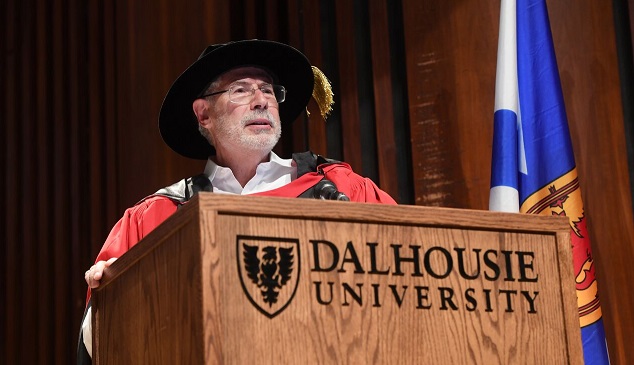Atlantic Canada’s I-Corps program is expected to launch in the autumn, having been given a boost this week by famed startup educator Steve Blank.
Mary Kilfoil, who teaches entrepreneurship at Dalhousie University, said the pieces are now in place to establish the first Canadian node for Innovation Corps, or I-Corps, the National Science Foundation’s program for commercializing scientific research. One person familiar with the situation said that “the funding for I-Corp has not been finalized yet” and there has yet to be an official announcement.
Blank, who teaches entrepreneurship at several universities including Stanford and UC Berkley, was one of the architects of the program. He received an honorary degree from Dalhousie this week and attended a lunch meeting with university and government officials Tuesday to discuss bringing I-Corps to Atlantic Canada.
“I’ve been a little bit blown away by how much good science there is here,” said Blank in an interview after the lunch. “It’s almost a criminal waste that there isn’t already an I-Corps here in Canada.”
Blank is best known as one of the pioneers of the lean startup methodology, in which startups canvas a wide range of potential clients to make sure they are producing something the market wants. The National Science Foundation in 2011 asked Blank to translate these processes into a program for academics. The result was the I-Corps, which is now offered at 10 nodes to help discoveries from fundamental research become new companies. Blank said “1,500 of the best U.S. scientists” have gone through the program in six years.
The program at Dalhousie will be open to academics across Atlantic Canada, said Kilfoil. Dalhousie has partnered with Washington, D.C.-based George Washington University to help train the staff and get the pilot program off the ground.
“The plan is to work with George Washington University over the next two years because they are certified NSF I-Corp trainers,” said Kilfoil.
CDL-Atlantic To Launch in the Autumn
The goal of I-Corps is to expose scientists to the thinking and processes that can transform their discoveries into commercial products. Each scientist teams up with an entrepreneur and a graduate student to manage the team’s lab, and together they learn what it would take to bring a product to market.
“It doesn’t guarantee success but we can reduce the infant mortality in startups a lot,” said Blank. “It can improve science and scientists. Once they are exposed to these ideas it changes everyone in their team for the next 20 years.”
He added that it would be best to situate the I-Corps in the engineering school rather than the business school, so the program is close to those who work with applied science.
Blank’s teachings were the basis of the work carried out by Launch Dal, the entrepreneurship group founded by Kilfoil and her husband Ed Leach. During his visit, Blank met current participants and graduates of the Launch Dal programs, and spoke to an audience of about 400 at a fireside chat.
He wrapped up his talk by urging the attendees to design an ecosystem in Atlantic Canada that adheres to the region’s specific circumstances.
“Every region needs its own playbook,” said Blank. “What does the Halifax ecosystem look like? I think that what’s been happening here for the past five years is fantastic, but what needs to be done to make it an Atlantic Canadian model?”
After a moment’s pause, he added, “But I’ve been blown away by what I’ve seen here.”










